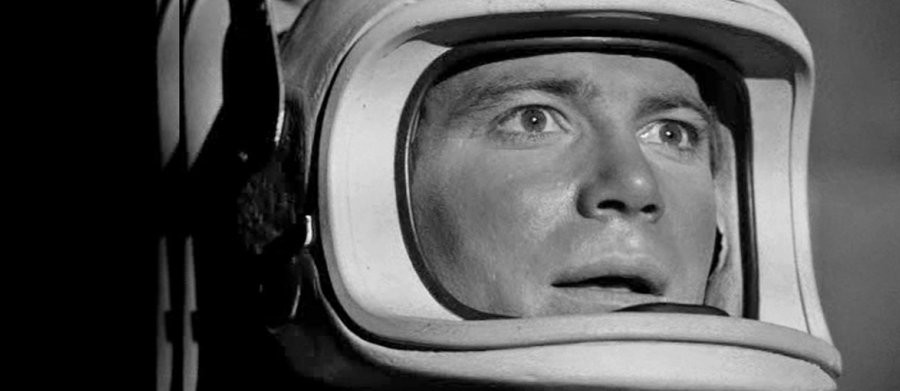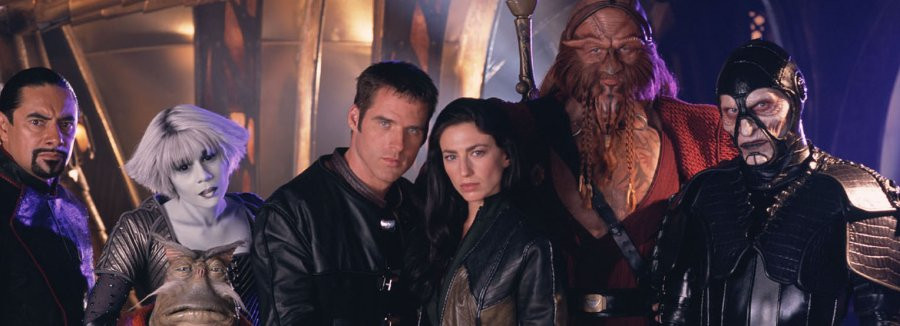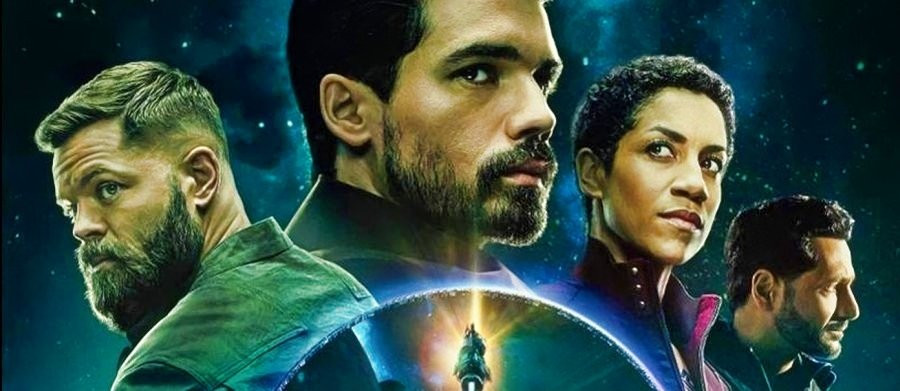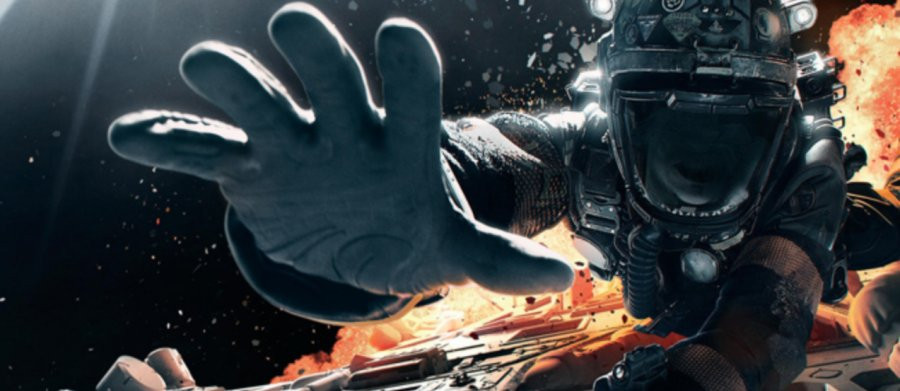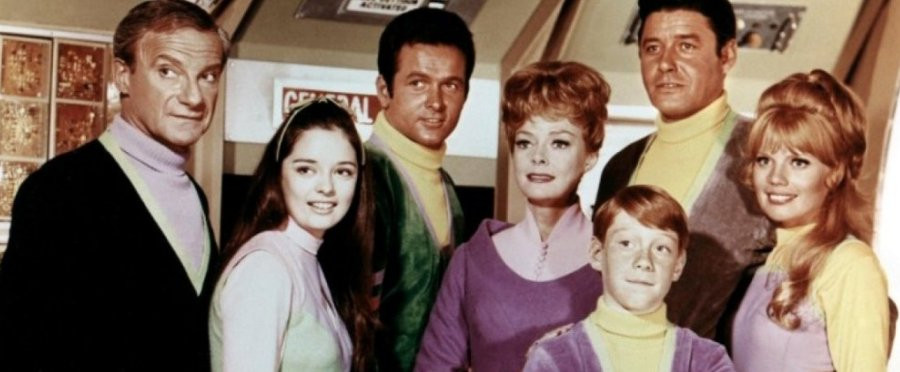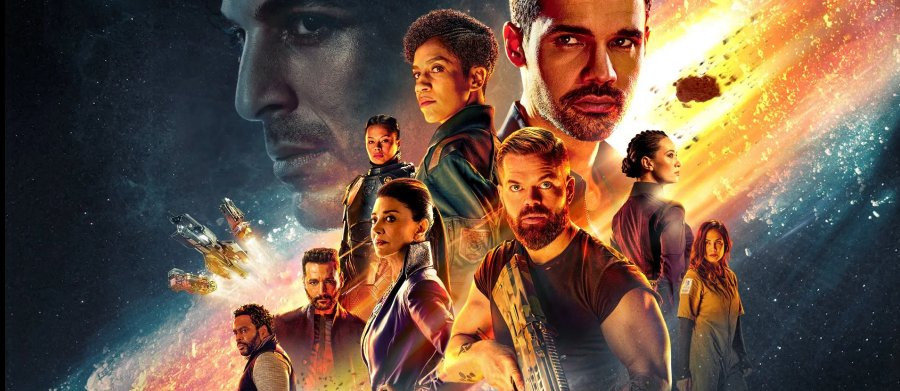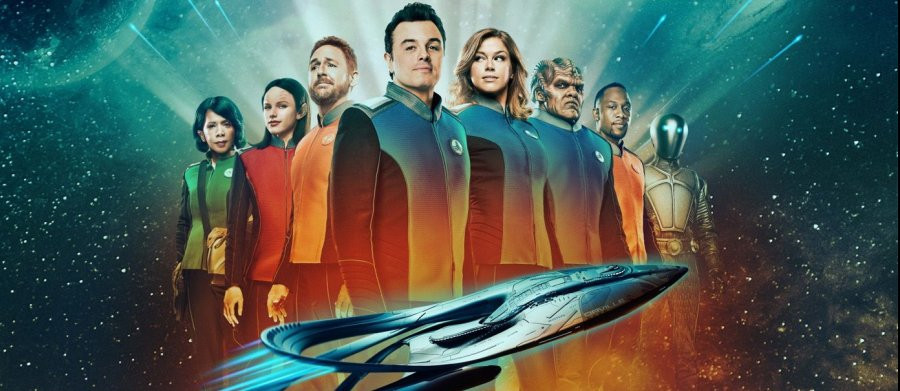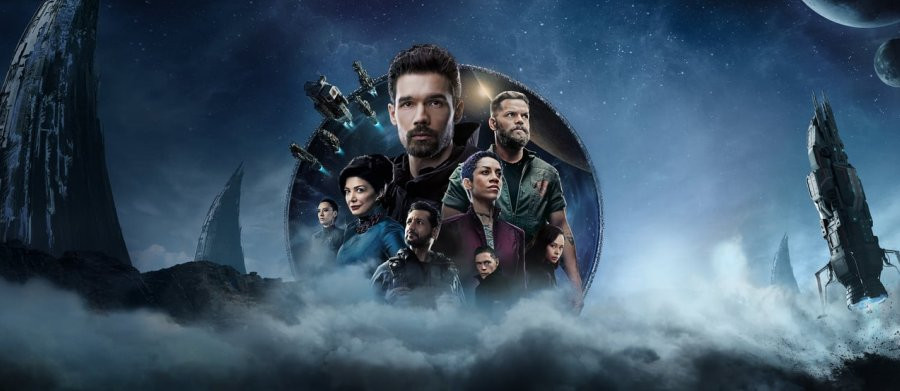
The Expanse - Season Three
This is an overview of the third season of The Expanse. Like the overviews of the first two seasons on this website, it is intended to be spoiler-light, but is nevertheless best appreciated if you already have some knowledge of what is going on. Those two previous overviews might be a good place to start but better still is to watch the whole thing. It really is highly recommended to anyone who takes science fiction, or simply good television drama of any sort, seriously.
Like Season Two, Season Three suffers - and it really does suffer - from a decidedly odd structure. Once again, it is divided into two distinct halves. The first six episodes are really just an immediate continuation and then conclusion of the second half of Season Two. Everything after that is basically a completely separate story. Happily, this time we do not have to wait for the next season for the conclusion of that story as we had to do twice before.

It was at the end of this season that the show was cancelled by the'Syfy' Channel, so the ending looked very final indeed at that point. In the event the cancellation did not turn out to be total: a few days later The Expanse was picked up by Amazon and became "the show saved by the fans." Since then Amazon have, at the time of writing, made two shorter and more self contained seasons that have worked a lot better as narratives, while maintaining longer story and character arcs. A sixth is in production and currently intended as the last, despite the authors of the books on which the series is based maintaining that more material is available.
Season Two ended on what was not so much a "cliffhanger" as an accelerating drive to the cliff. Season Three begins with everything finally going over the edge. The Cold War between Earth and Mars gets officially hot.

At first, the principal characters seem to have been rather left behind by the plot, as the focus shifts to the movement of great fleets and nuclear strikes resulting in megadeaths. However, a series of convenient coincidences finally unites all surviving principals, including UN Deputy Under-Secretary Chrisjen Avasarala (Shohreh Aghdashloo) and Martian Marine Bobbie Draper (Frankie Adams) with James Holden (Steven Strait) and his crew, on the rogue gunship 'Rocinante.' This is the only time this ever happens and it is good while it lasts.
It nevertheless presents our heroes with a dilemma: they must choose between prioritising their existing quest to rescue the daughter of gentle botanist Prax Meng (Terry Chen), with whom Amos (Wes Chatham) forges an unlikely friendship, or getting out a message for Avasarala that might stop the War.
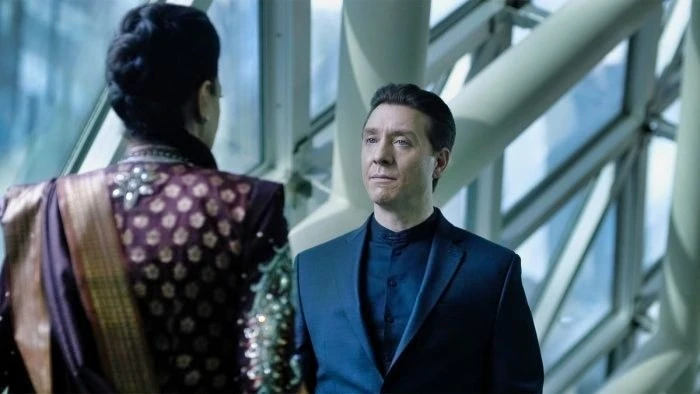
Avasarala is sorely missed back on Earth, where her absence means there is no one to counteract the influence of her ruthless rival Sadavir Errinwright (Shawn Doyle) on the Secretary-General of the United Nations, who is now the ruler of the whole planet. Secretary-General Sorrento-Gillis (Jonathan Whittaker), elected as a radical reformer, has an impressive appearance but is gradually revealed as a vain, weak, vacillating politician who lacks direction in a crisis and is putty in the hands of his advisers. It is an all too credible characterisation of a leader out of his depth.
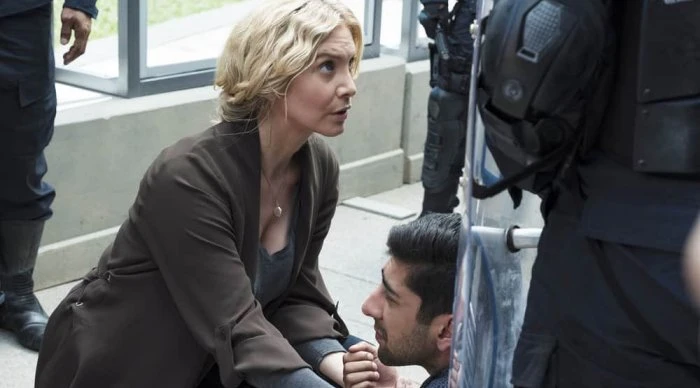
The "good angel" on his shoulder in Avasarala's place is a new character, Dr Anna Volovodov. Formerly a radical political activist with Sorrento-Gillis, she is a lesbian, a mother, a nurse, and a Methodist Pastor. That sentence might provoke fears that she is one of those box ticking characters that have spoiled so many recent productions. However, this is where The Expanse shows its superiority. It presents us with a flawed, complicated, fully rounded woman, not a label. Compassionate and warm, she can also be selfish, arrogant, judgemental, and sanctimonious. Her political beliefs can seem naive and at one point they influence a decision that costs many lives. She is outmanoeuvred easily by the experienced Errinwright - which Avasarala would not have been. She can appear nervous and vulnerable. Yet she learns from her mistakes, and she proves to be brave and decisive at crucial moments. Later in the season an apparently foolhardy act makes her the right woman at the right time to pull off a surprise rescue. It helps that she is played with great skill and charm by genre veteran Elizabeth Mitchell from Revolution and the reboot of V.
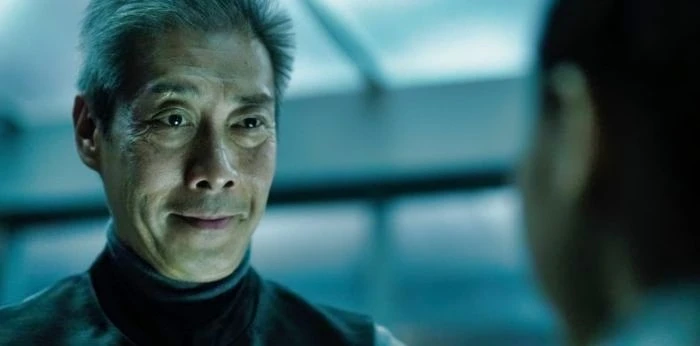
This is perhaps a good place to note that the "villains" are in general one of the great strengths of The Expanse. Apart from a couple of mad scientists, who, it is implied, got so consumed by their work that they lost all sense of proportion and morality, the antagonists are all three dimensional characters. Errinwright and his industrialist "frenemy" Jules-Pierre Mao (Francois Chau) are given defensible points of view and moments of humanity. Errinwright is actually a very good "Wartime Consigliere." He understands that risk and sacrifice may be necessary to save lives overall. He provokes a war not because he is bloodthirsty but because he believes it is inevitable and calculates that his side has a better chance if it happens earlier. He plays the odds sensibly. At the same time, it was difficult not to feel at least some sympathy in the previous season when we saw him trying to prepare his son for what at that point looked like his imminent disgrace or suicide. Even Mao has a moment of conscience, or at least sentiment, when he seems to throw away his own interests by ordering an end to experimentation on children - needless to say, it does not last.
Everything comes to a head in the sixth episode as it did in the fifth of the previous season. To be honest, this lacks the emotional punch of the latter, but there is still quite a toll among supporting characters, and Bobbie Draper has a good scene proving the easy superiority of a trained professional soldier in full combat gear over even the best amateurs with guns. 'Star Wars' franchise please note.
Then, in the very next episode, everything is suddenly very different and an entirely new story begins. It is rather disorienting. Several months have passed and much has happened off camera. Avasarala has had a big promotion, which seems a bit unlikely: yes, she deserves it, but it is not exactly common in politics for virtue to be rewarded so promptly.

Meanwhile, the "Belters" of the Outer Planets Alliance (OPA) appear to have established some sort of independence, but it is not clear who, if anyone, is in charge. Fred Johnson (Chad L Coleman) somehow rustled up a fleet of salvage vessels earlier and put them under the command of his right hand woman, Camina Drummer (Cara Gee), to salvage the biggest ship in the System, which he had previously built for, and then stolen from, the Mormons. This is now the flagship of a new OPA Navy. Drummer retains command, but, as part of an off screen deal between Johnson and OPA demagogue Anderson Dawes, she must accept a contingent of Dawes loyalists among her officers.
These arrive wearing spiffy new OPA Navy uniforms, but the clothes cover a rum bunch of characters, including a former pirate as Camina's First Officer, and our old friend Diogo (Andrew Rotilio), who has somehow become a Lieutenant, which says a lot about the new Navy.
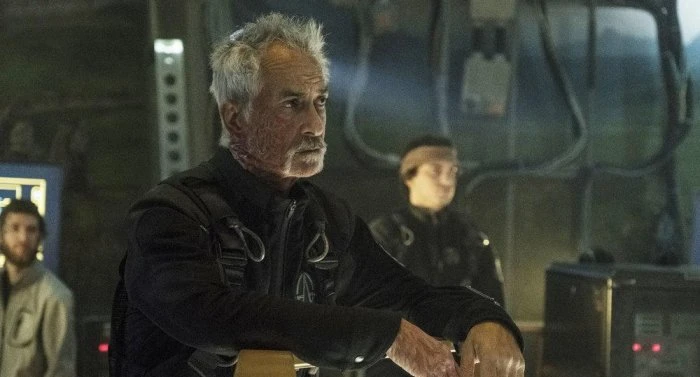
By far the best aspect of this second half of Season Three is the evolving relationship between Drummer and her unwanted First Officer, Klaes Ashford. Since the latter is played by the superb David Strathairn, it is no surprise that he steals the whole show. Convincingly fluent in "Belter Creole," Strathairn, usually noted for tightly controlled characterisations, here makes the deliberate choice to cut loose completely and go "full pirate," which is what the part demands.
Yet there is subtlety too. There is real ambiguity about whether Ashford is here, as Drummer assumes, to subvert her command, or whether he is actually trying very hard to be a loyal and effective First Officer. Perhaps Ashford is not certain himself. He has certainly got a better grasp than Drummer of how they will all need to change if they are to establish a new Navy and a new nation. At times he is genuinely supportive, not least when Drummer gives a cracker of a speech before taking her ship into a very dangerous situation. Gee also deserves a lot of credit for the way she has developed her character from relatively humble beginnings, and she makes a great double act with Strathairn, sometimes adversarial, sometimes a headstrong youngster learning reluctantly from a more experienced mentor.
While there is therefore no shortage of human conflict in the later episodes of the season, it is secondary to the main plotline, which is more in Arthur C Clarke territory. The bickering humans are forced to unite when threatened by an incomprehensible unseen power. Although this failure to put a human face on the main adversary does rather reduce the dramatic tension of the second half, this is balanced by the welcome (sort of) return of a major character from before, which is given a scientifically credible explanation rather than ascribed to fake mysticism.
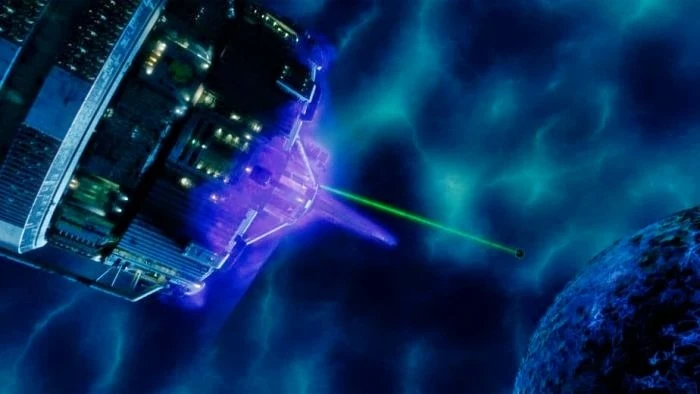
The visual style of The Expanse continues to be as compelling as the characters and story. Some of the rather surreal effects in the second half of the season may be a matter of personal taste, but the evocation of the Northern Lights is quite sublime.
For all its structural oddity, Season Three is where The Expanse really came of age. All the story and character arcs finally came together in a single cohesive plotline, and it includes some of the highest rated episodes on IMDb. More importantly, the characters and their relationships were fully established, providing a solid platform for future seasons. No wonder that fans were particularly upset by its cancellation by 'Syfy' and relieved by its rescue by Amazon. It is perhaps not so much the peak of The Expanse as finally reaching the plateau after a long climb. Some of the best was yet to come.
Review: John Winterson Richards
John Winterson Richards is the author of the 'Xenophobe's Guide to the Welsh' and the 'Bluffer's Guide to Small Business,' both of which have been reprinted more than twenty times in English and translated into several other languages. He was editor of the latest Bluffer's Guide to Management and, as a freelance writer, has had over 500 commissioned articles published.
He is also the author of ‘How to Build Your Own Pyramid: A Practical Guide to Organisational Structures' and co-author of 'The Context of Christ: the History and Politics of Rome and Judea, 100 BC - 33 AD,' as well as the author of several novels under the name Charles Cromwell, all of which can be downloaded from Amazon. John has also written over 100 reviews for Television Heaven.
John's Website can be found here: John Winterson Richards
Published on June 25th, 2021. Written by John Winterson Richards for Television Heaven.


